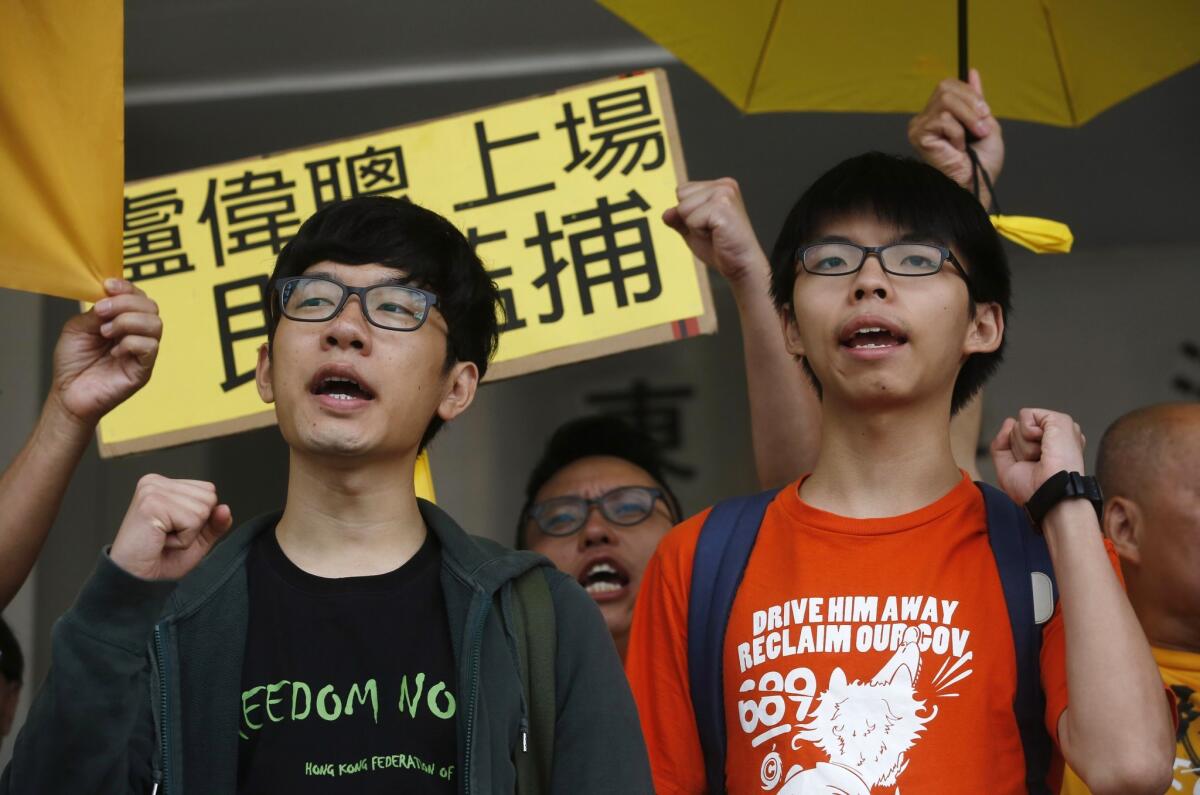Hong Kong student leaders charged in protest from 2014

Student leaders Joshua Wong, right, and Nathan Law shout slogans outside a court in Hong Kong on July 17. The activists and two other defendants appeared in court after being charged with obstructing police officers as they took part in an anti-China protest in June 2014.
- Share via
Reporting from Hong Kong — Two of the student leaders of last fall’s pro-democracy demonstrations appeared in court Friday on charges stemming from a protest in June 2014, with the defendants decrying the prosecution as a heavy-handed political move orchestrated by authorities in Beijing.
Joshua Wong, leader of the high school activist group Scholarism; Nathan Law, head of the Hong Kong Federation of Students; and two others face charges of obstructing police officers.
Last June, they and about 20 other demonstrators torched an outsized replica of a controversial document issued by Chinese Communist authorities. The document asserted that mainland China has “complete jurisdiction” over Hong Kong, a former British colony that returned to Chinese rule in 1997 as a semiautonomous territory.
The demonstration was staged at the Chinese Liaison Office of the Central People’s Government, which houses officials handling defense and foreign affairs, two key areas in which Hong Kong is subject to Beijing’s authority. No one was injured.
All four were freed Friday on $65 bail, with a pretrial hearing scheduled for late August. If convicted, they face terms of up to two years behind bars and fines of up to $645.
Presiding over the hearing, principal magistrate Bina Chainrai questioned the prosecution on the lapse of time between the incident — 13 months — and the formal arrests, which were made this week. The prosecution maintained that the police took the time “to gather evidence in order to make the arrests.”
After the hearing, Law said: “The government wants to send a clear signal to deter any future protest that despoils the dignity of the Chinese Communist Party.” Added lawyer Michael Vidler, who represents Wong: “It has all the hallmark of a persecution.”
Hong Kong returned to Chinese rule under an arrangement known as “one country, two systems.” The semiautonomous territory of 7.3 million has been allowed to keep a wide range of civil liberties and its British common law system, and it was granted “a high degree of autonomy” for 50 years under a mini-constitution known as the Basic Law.
But in recent years, many Hong Kongers have come to regard the Liaison Office as a command center of what they see as Beijing’s meddling in Hong Kong affairs. The office has been the site of numerous protests, but the demonstrations rarely have resulted in prosecutions — until now.
Ching Cheong, longtime local political commentator and journalist on China’s politics, called the prosecutions “a retaliatory move in the wake of the Umbrella Movement,” last fall’s pro-democracy street protests.
“The Hong Kong government is under pressure from Beijing and loyalists here to take tough measures against those involved,” he said. “The high-profile prosecution also serves to undercut the morale of the protest movement.”
The tens of thousands of demonstrators who took to the streets last fall called on Beijing to allow free and fair elections for the city’s highest office, with a genuine choice of candidates.
After 10 weeks of sit-ins, clashes with police and a brief round of dialogue between Hong Kong leaders and protest organizers, no agreement was reached. However, the election rules proposed by Beijing were rejected by Hong Kong lawmakers last month.
Despite the return of Chinese sovereignty, Hong Kong has maintained its lively, freewheeling protest culture. Charges stemming from such gatherings are rare, unless physical harm is caused. For example, in April, a leader from one political party was sentenced to three weeks in jail for pelting the territory’s finance secretary with an egg.
To date, no charges have been filed against any of the leaders of the Umbrella Movement, although some may face contempt charges for failing to disperse after a court ordered the demonstrators’ encampments to be cleared from public roadways.
A score of participants were hauled into court in March for preliminary hearings, but most have had their charges vacated.
Ching said he didn’t expect the current prosecutions of the two student leaders — as well as the other two defendants, legislator Albert Chan and Raphael Wong, leader of the League of Social Democrats party — would serve as much of a deterrent.
“Those who want to protest will still carry on,” Ching said. “And the young protesters in Hong Kong especially don’t give in to this kind of intimidation.”
Law is a special correspondent.
More to Read
Sign up for Essential California
The most important California stories and recommendations in your inbox every morning.
You may occasionally receive promotional content from the Los Angeles Times.













